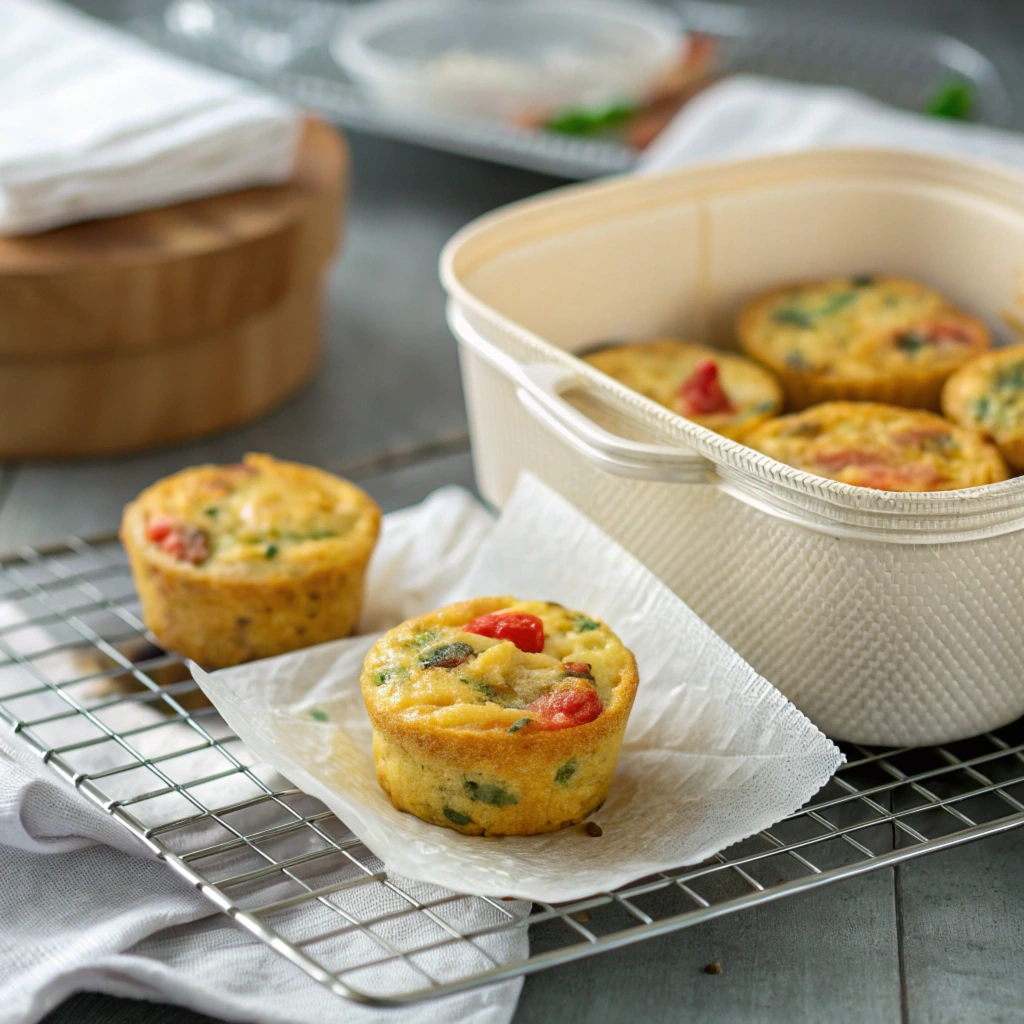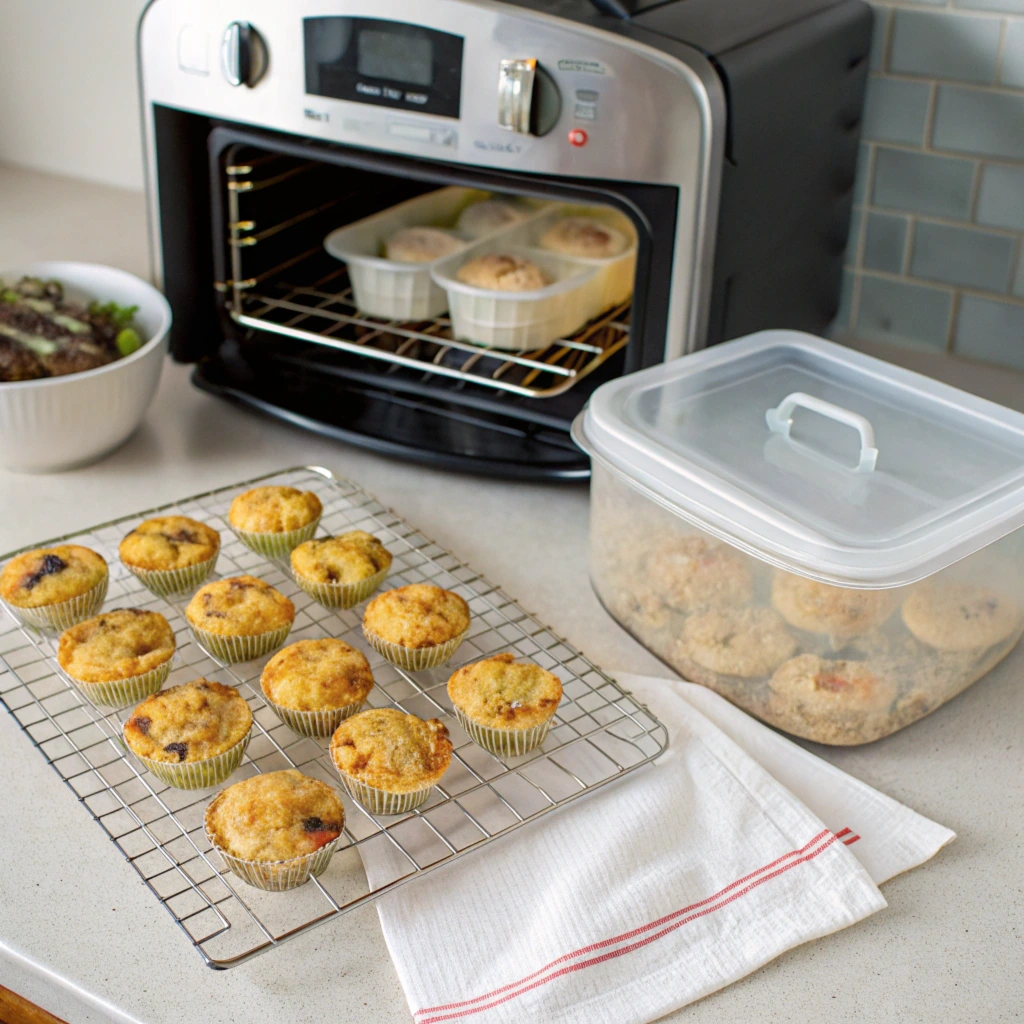Egg muffins are a quick, versatile, and nutritious breakfast option, ideal for meal prep or busy mornings. But many people often wonder, “Why are my egg muffins soggy?” If you’ve ever bitten into one and found it soggy, rubbery, or dense, you’re not alone. Soggy egg muffins are a common issue that can ruin this otherwise perfect dish.
This guide dives deep into why your egg muffins turn soggy, how to avoid it, and the best techniques for baking, storing, and reheating them properly. By identifying common culprits like excess moisture in vegetables or improper storage, you can achieve consistently fluffy muffins. You’ll also get tips to troubleshoot other problems, like muffins sticking to the pan or turning rubbery.
Let’s begin by exploring the main reasons behind soggy egg muffins and simple ways to fix them so you can enjoy perfect results every time.
Common Reasons Why Egg Muffins Turn Soggy
Excess Moisture in the Ingredients
One of the top culprits for soggy egg muffins is excess water released by certain ingredients during baking. Vegetables like spinach, mushrooms, zucchini, and tomatoes are packed with moisture. As they cook, they release water into the batter, leaving your muffins watery and unappetizing.
To prevent this, always pre-cook moisture heavy vegetables by sautéing or roasting them before adding them to your egg mixture. This step ensures the excess water evaporates, keeping your muffins light and fluffy.
Overbaking or Undercooking Eggs
Eggs are incredibly sensitive to temperature and baking time. Undercooking them leaves the mixture too runny, while overbaking results in rubbery, dense muffins that can also trap excess moisture.
For best results:
- Bake at 350°F (175°C) for 18–20 minutes.
- Use a toothpick to test doneness — it should come out clean with no liquid batter clinging to it.
Storing Hot Egg Muffins
Storing muffins immediately after baking can trap steam, causing condensation inside the container. This moisture seeps back into the muffins, making them soggy.
Instead:
- Allow your muffins to cool completely on a wire rack before storing them.
- Avoid sealing them in an airtight container until they are room temperature.
How to Prevent Soggy Egg Muffins
Pre-cook Vegetables to Reduce Moisture
When it comes to egg muffins turning soggy, uncooked vegetables are a big offender. Veggies like spinach, zucchini, and mushrooms release a ton of water while baking, which can wreak havoc on the texture of your muffins.
To prevent this, always pre-cook your vegetables. Here’s how:
- Sauté spinach, mushrooms, or onions for a few minutes until the water evaporates.
- Roast moisture heavy veggies like zucchini or tomatoes to draw out excess liquid.
- Pat cooked veggies dry with a paper towel before mixing them into the batter.
This simple step ensures that your egg muffins stay fluffy instead of turning into a watery mess.
Use the Right Cheese and Add-Ins
Adding cheese to egg muffins makes them delicious, but not all cheeses are created equal. High moisture cheeses like mozzarella can release water during baking, contributing to sogginess. Instead, opt for low moisture varieties like cheddar, feta, or goat cheese.
Other add-ins like cooked meats or leftover chicken can also carry moisture, so:
- Use pre-cooked meats to avoid water seeping into the batter.
- Drain any liquid or grease before adding ingredients to your muffin mixture.
Choosing the right cheese and add-ins is a small change that makes a big difference in texture.
Proper Baking Techniques
Perfect egg muffins come down to mastering baking time and temperature. Here’s what works best:

- Bake at 350°F (175°C) for 18–20 minutes. This temperature cooks the eggs evenly without drying them out.
- Avoid overfilling muffin cups. Leave a bit of space to allow the eggs to rise without spilling over.
Using a timer and testing for doneness ensures your muffins are cooked just right. A clean toothpick or firm tops are signs your muffins are ready to be pulled from the oven.
Proper Cooling and Storage Methods
Hot muffins fresh from the oven might look great, but storing them right away can ruin their texture. Cooling your muffins completely is key to keeping them fresh.
- Let egg muffins cool on a wire rack for at least 15–20 minutes.
- Once cooled, store them in an airtight container in the fridge. Adding a paper towel at the bottom of the container can absorb any extra moisture.
These steps help keep your egg muffins moist but not soggy, so they stay perfect for days.

Best Practices for Baking Perfect Egg Muffins
Choosing the Right Muffin Pan or Liners
The type of muffin pan or liner you use can make or break your egg muffin success. Nonstick muffin pans are ideal because they allow for easy removal without sticking or tearing. If you don’t have one, silicone muffin liners are another great option — they’re reusable and prevent sticking.
If using regular paper liners, consider these tips:
- Lightly spray liners with nonstick cooking spray.
- Avoid overfilling, as too much batter can cause sticking and uneven cooking.
Using the right pan or liner ensures you get perfect, mess free egg muffins every time.
Balancing Egg to Add-In Ratios
Finding the right balance between eggs and add-ins is critical for texture. Too many ingredients can overwhelm the eggs, making muffins dense or unevenly cooked.
Here’s a quick rule of thumb:
- Use about 1/4 cup of add-ins per muffin cup.
- Fill each cup with two thirds egg mixture and one third vegetables, meat, or cheese.
This ratio helps the eggs bind the ingredients together while keeping the muffins light and fluffy.
Using the Right Oven Temperature
Temperature consistency is the secret to baking perfect egg muffins. Baking at too high a heat can dry out the edges while leaving the center undercooked. Too low, and the muffins may not set properly.
- Set your oven to a steady 350°F (175°C).
- Avoid opening the oven door frequently, as this can cause temperature drops.
With the right temperature, your muffins bake evenly and rise to a fluffy, golden perfection.
Troubleshooting Common Egg Muffin Problems
Why Are My Egg Muffins Rubbery?
Egg muffins can turn rubbery when they’re overcooked. Eggs are delicate and will become tough when exposed to too much heat for too long.
To avoid this issue:
- Bake at 350°F (175°C) and stick to the 18–20 minute baking window.
- Remove the muffins from the oven as soon as the tops feel firm to the touch. Overbaking even for a few minutes can ruin the texture.
Additionally, avoid using too many eggs without balancing them with other ingredients like cheese or vegetables. Eggs alone can make the muffins dense and unappealing.
Why Do My Egg Muffins Stick to the Pan?
Sticking is one of the most frustrating problems when baking egg muffins. Nonstick pans or silicone liners are your best bets. If you’re using a regular pan:
- Grease the muffin cups generously with cooking spray, butter, or oil.
- Consider lining the cups with parchment paper muffin liners.
Still having issues? It might be time to upgrade to a silicone muffin tray. They’re reusable, easy to clean, and ensure muffins slide right out.
How to Fix Soggy Muffins After Baking
If you’ve already baked soggy muffins, there’s still hope. You can salvage their texture with a quick reheat:
- Pop them back in the oven at 300°F (150°C) for 5–10 minutes to dry them out.
- Use a toaster oven for smaller batches, as it works faster and avoids overheating.
Reheating not only fixes soggy muffins but also revives their flavor and warmth.
How to Store and Reheat Egg Muffins Properly
Storing Egg Muffins for Freshness
Proper storage is key to maintaining egg muffin quality. If muffins are stored while still hot, they’ll create condensation, turning soggy over time.
Follow these steps for storage:
- Let the muffins cool completely on a wire rack.
- Place them in an airtight container, layering them with paper towels to absorb any extra moisture.
- Store in the refrigerator for up to 4 days.
If you’re planning to keep muffins longer, freezing works wonders:
- Wrap each muffin individually in plastic wrap.
- Place them in a freezer safe bag or container. They’ll stay good for up to 3 months!
Reheating Techniques Without Making Them Soggy
Reheating egg muffins the right way ensures they taste just as good as freshly baked. Here’s how:
- Microwave: Wrap the muffin in a damp paper towel and heat for 20–30 seconds. This prevents drying out.
- Oven: Place muffins on a baking tray and warm at 350°F (175°C) for 10–12 minutes.
- Air Fryer: Reheat at 300°F (150°C) for 5–7 minutes for perfectly warm, crispy edges.
Avoid reheating directly from the fridge without thawing, as this can make the muffins unevenly heated and rubbery.
For more delicious egg muffin recipes, check out our Sausage Egg and Cheese Muffins, it’s an easy and protein packed option perfect for breakfast!

FAQs: Why Are My Egg Muffins Soggy?
How Do I Keep Egg Muffins From Getting Soggy?
To prevent soggy egg muffins, focus on reducing moisture in your ingredients. Why are my egg muffins soggy? This often happens when vegetables like spinach, mushrooms, and tomatoes release water during baking. To avoid this, pre-cook vegetables to remove excess moisture before adding them to the batter. Once baked, let the muffins cool completely on a wire rack. Storing hot muffins in an airtight container traps steam, leading to sogginess. By cooling them first and storing properly, you’ll ensure your muffins stay fluffy and fresh, solving the issue of soggy egg muffins.
Can I Make Egg Muffins Ahead of Time?
Absolutely! Egg muffins are perfect for meal prep. Bake a batch, let them cool, and store them in the fridge for up to 4 days. For longer storage, freeze them individually wrapped, and reheat when needed. Follow proper reheating techniques to keep them from becoming rubbery or soggy.
Why Do My Egg Muffins Deflate?
Egg muffins can deflate if too much air is incorporated into the egg mixture while whisking. To avoid this:
- Whisk the eggs gently until just combined.
- Avoid overmixing the batter.
- Bake at a steady temperature, and don’t open the oven door too often.
This will help the muffins maintain their shape and texture after baking.
How Do I Prevent Egg Muffins From Sticking to Paper Cups?
To stop muffins from sticking, use silicone muffin liners or a well greased nonstick pan. If you prefer paper liners, lightly spray them with cooking spray before pouring in the batter. These tricks ensure your muffins slide out cleanly without tearing.
Summary of Why Egg Muffins Turn Soggy and How to Fix It
Egg muffins are a delicious and versatile breakfast option, but many people encounter one common issue: Why are my egg muffins soggy? Excess moisture, improper storage, and baking mistakes are the most common culprits. Understanding these causes and applying the right solutions can help you make perfect, fluffy egg muffins every time.
The Main Reasons Egg Muffins Turn Soggy
One of the key reasons egg muffins turn soggy is moisture-heavy ingredients like spinach, tomatoes, or mushrooms. These vegetables release water as they cook, leading to sogginess. To prevent this, always pre-cook and drain vegetables before adding them to your egg mixture.
Improper storage is another major issue. Placing hot muffins in an airtight container traps steam, which condenses and makes the muffins wet. Allow your muffins to cool completely on a wire rack before storing them to keep them fresh and fluffy.
Overbaking or underbaking can also contribute to poor texture. Baking at 350°F (175°C) for 18–20 minutes ensures muffins set properly without becoming rubbery or dense. Always check doneness with a toothpick — it should come out clean.
Quick Fixes for Soggy Muffins
If you’re already asking yourself, “Why are my egg muffins soggy?”, here’s how you can fix them:
- Reheat muffins in the oven at 300°F (150°C) for 5–10 minutes to dry out excess moisture.
- Use an air fryer to restore their fluffy texture and crispy edges.
- Avoid microwaving directly, as it can worsen the sogginess. If needed, wrap muffins in a paper towel and heat in short bursts.
Proper Storage to Prevent Soggy Egg Muffins
To avoid future issues with soggy egg muffins:
- Store cooled muffins in an airtight container lined with paper towels.
- Refrigerate for up to 4 days, or freeze them individually for up to 3 months.
By addressing moisture, improving storage habits, and mastering the baking process, you can say goodbye to soggy muffins. The next time you wonder, “Why are my egg muffins soggy?”, you’ll have the solutions to bake perfect, fluffy, and delicious muffins every single time.

